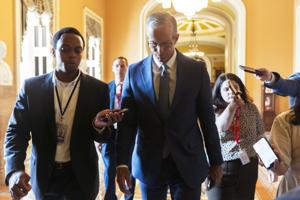
Vice President JD Vance made a notable appearance at the Capitol early this morning as senators continued to navigate a high-stakes overnight session concerning President Donald Trump’s controversial bill, which proposes significant tax breaks alongside substantial spending cuts. Republican leaders are actively seeking strategies to garner the necessary support to pass the bill.
The session, marked by intense discussions and strategic negotiations, underscores the critical nature of the legislation for the Trump administration. The bill, which aims to reshape the economic landscape, has been met with both support and skepticism from various quarters.
Key Provisions of the Bill
The proposed legislation includes a series of tax cuts designed to stimulate economic growth, alongside spending reductions intended to address the national deficit. The bill’s proponents argue that these measures will invigorate the economy by increasing disposable income for individuals and businesses alike.
However, critics caution that the spending cuts could adversely affect essential public services. The debate has been particularly heated around proposed reductions in healthcare and education funding.
Political Dynamics and Challenges
The Republican leadership faces a formidable challenge in rallying support within its ranks. While the GOP holds a majority in the Senate, the margin is slim, and internal divisions have surfaced. Some moderate Republicans have expressed concerns over the potential impact of the spending cuts on their constituencies.
Meanwhile, Democrats have largely united in opposition, arguing that the bill disproportionately benefits the wealthy at the expense of middle and lower-income Americans. Senate Minority Leader Chuck Schumer criticized the bill, stating,
“This legislation is a giveaway to the rich, masquerading as economic reform.”
Historical Context and Expert Opinions
This legislative push is reminiscent of previous Republican efforts to overhaul the tax code, notably the Tax Cuts and Jobs Act of 2017. That bill, which also faced significant opposition, ultimately passed and has been credited with boosting corporate profits but criticized for increasing the federal deficit.
Economists remain divided on the potential outcomes of the current bill. Dr. Emily Chen, a professor of economics at Georgetown University, noted,
“While tax cuts can stimulate short-term growth, the long-term effects depend heavily on how they are structured and what spending cuts accompany them.”
Implications and Future Prospects
The outcome of this legislative effort could have profound implications for the upcoming election cycle. Success in passing the bill may bolster the Republican Party’s economic credentials, while failure could expose fractures within the party and weaken its legislative agenda.
As the session continues, all eyes remain on key swing votes within the Senate. The coming hours will be critical as Republican leaders attempt to secure the necessary majority.
Looking forward, the bill’s passage or failure will likely influence the political landscape, shaping campaign narratives and voter priorities in the lead-up to the next election.






